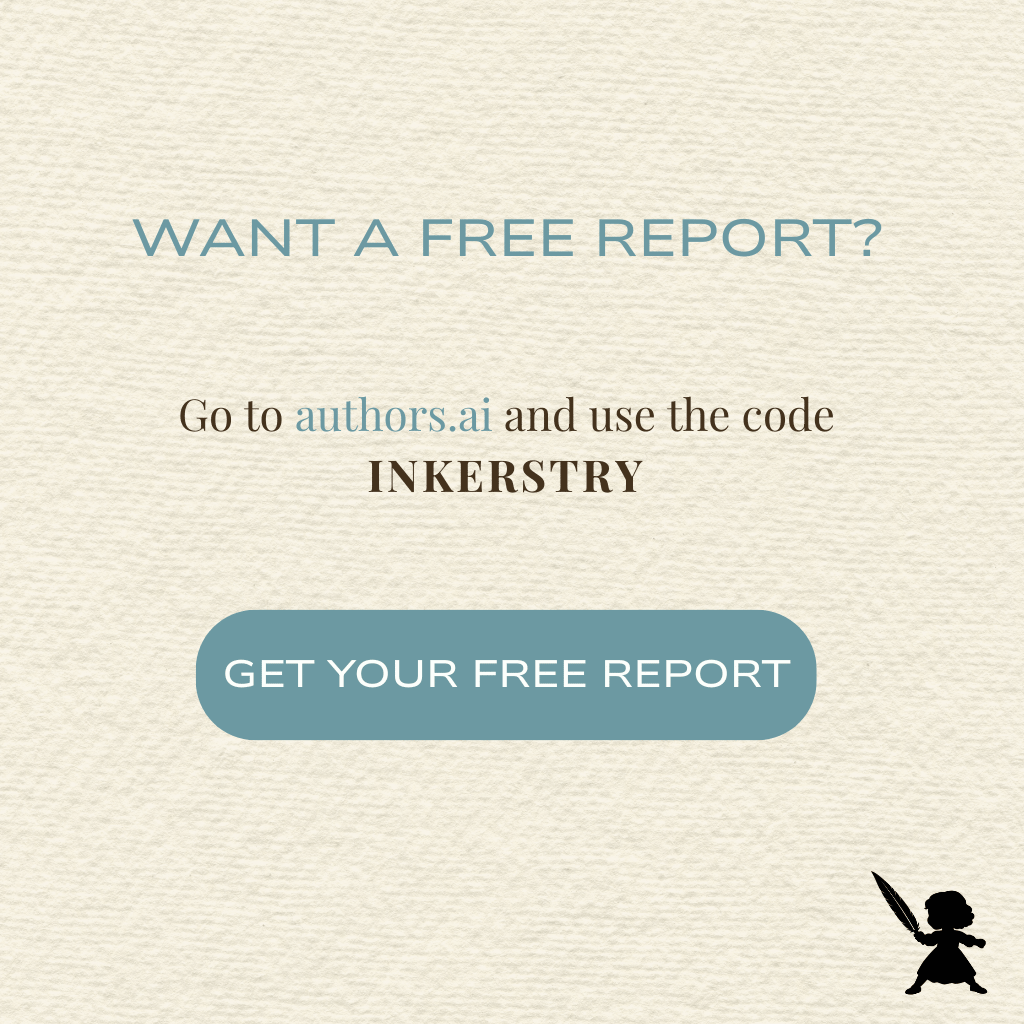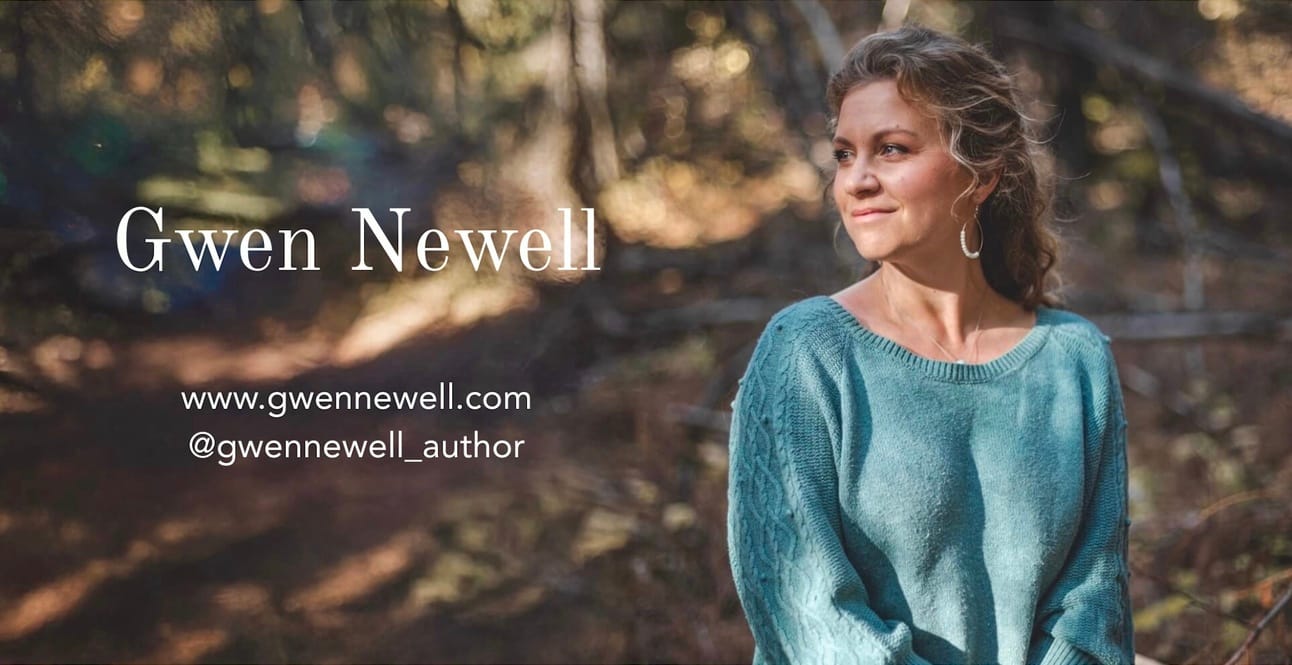- A Skirmish of Wit
- Posts
- The June Skirmish
The June Skirmish
How to be a great writer (by not writing), how AI can help with line edits, and more!

Hello, Skirmishers!
I write to you in the exhilarating slump of post-novel success. As you’ll read below, I just submitted draft 2 of my middle grade adventure novel to my editors. Yay! Oh, no. I feel like I did back in my undergrad days at New Saint Andrews College as soon as finals were over. What exactly do I do with myself? (Answer: Summer. We summer hard.)
Read on for the following…
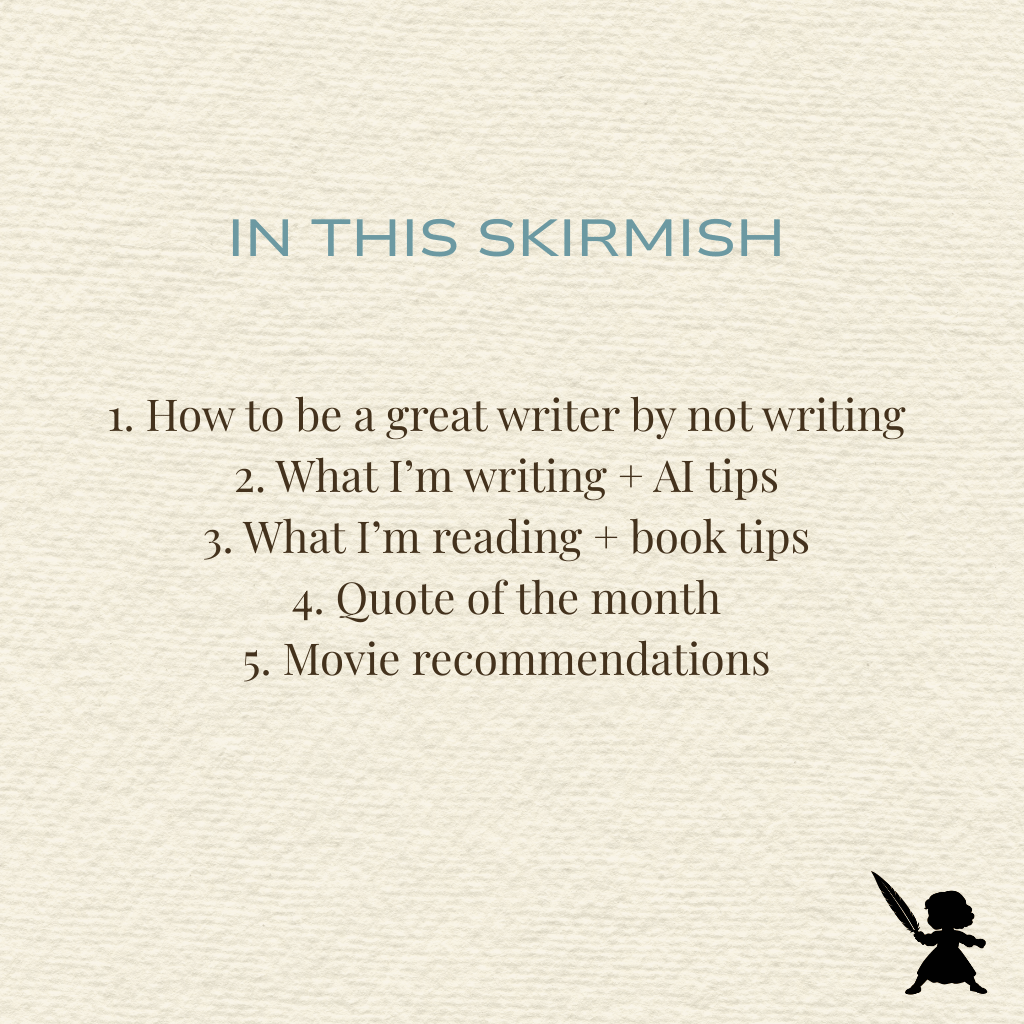
How to Be a Great Writer by Not Writing
Here’s a tip I wish I’d had when I was 15. It’s for you young writers especially.
If you can’t do anything except write (that is, if you suck at everything besides writing), then you won’t be a great writer.
The world might use the term “great writer” to mean “an expert at stringing sentences together,” but I’m using the word “great” to mean truly great. Great all the way down. Great in your private life. Great to your family. Great in God’s eyes.
Great writers are multi-faceted, multi-talented, multi-dimensional. Capable at many tasks. Serving others in a variety of fields. Giving themselves away in areas besides their computers or writing journals.
If you find yourself writing all the time (that means you, aspiring teenage writers!), but you can’t do math, write code, bake brownies, change a tire, plant a garden, play football, knit a beanie, host a dinner, strum the guitar, or make sourdough bread with any degree of excellence…try putting the pen down for a while. Flex new muscles. Learn different skills.
Developing yourself into a well-rounded human being will make your writing more interesting, but more importantly, you will be a better writer because you took the trouble to be a better person first. Wherever you go, there you are. You can’t be a great writer if you’re a monomaniacal one-trick pony, in the same way that a man can’t ultimately be a fantastic CEO if he’s a terrible father. Make sense?
So you want to be a great writer? Get good at stuff besides writing!
I took my own advice this week and learned the first steps in floral arrangement. Will I ever be a florist? Snort. But will I splash my house with blooms that look snazzier than they would have? Yes!

Writing middle grade novels is great, but they won’t beautify your table (or please your flower-loving kitty) nearly as well as a bundle of spring.
What I’m Writing + AI Tips
Sitting in my favorite coffee shop last Wednesday, I finally emailed the new draft of my Orpheus middle grade adventure novel back to my editors. Huzzah! They read and liked draft 1 in January, but it needed work before we could consider a book deal. So I spent the last four months 1) revising my hero’s abilities, goals, and motivation, 2) improving a big plot device, 3) giving the midpoint a bullseye 4) tightening a bloated Act II, 5) cutting two duplicate characters (which also helped with the saggy Act II), and 6) chasing other miscellaneous fallout changes.

What will I do while waiting for feedback on draft 2? READ, clean, crochet, organize closets, arrange flowers, haunt the local pool quasi daily, and plan a sequel.
Then came the fun part: line edits.
I don’t do ruthless line edits until closer to publication, once the manuscript has gotten the green light from my editor. I don’t see much point in killing myself over every turn of phrase when I might very well delete that whole paragraph.
However, thanks to AI, I did give my manuscript a pretty good spring-cleaning. I did this in two steps.
First, I used Authors AI to analyze my most commonly used adverbs, adjectives, verbs (especially being and helping verbs), and more.
Authors AI did something I could never do: it counted all the words in my book, and gave me charts of the ones I used the most. Did you know it’s possible to use the word “only” 79 times in a single novel? It is.
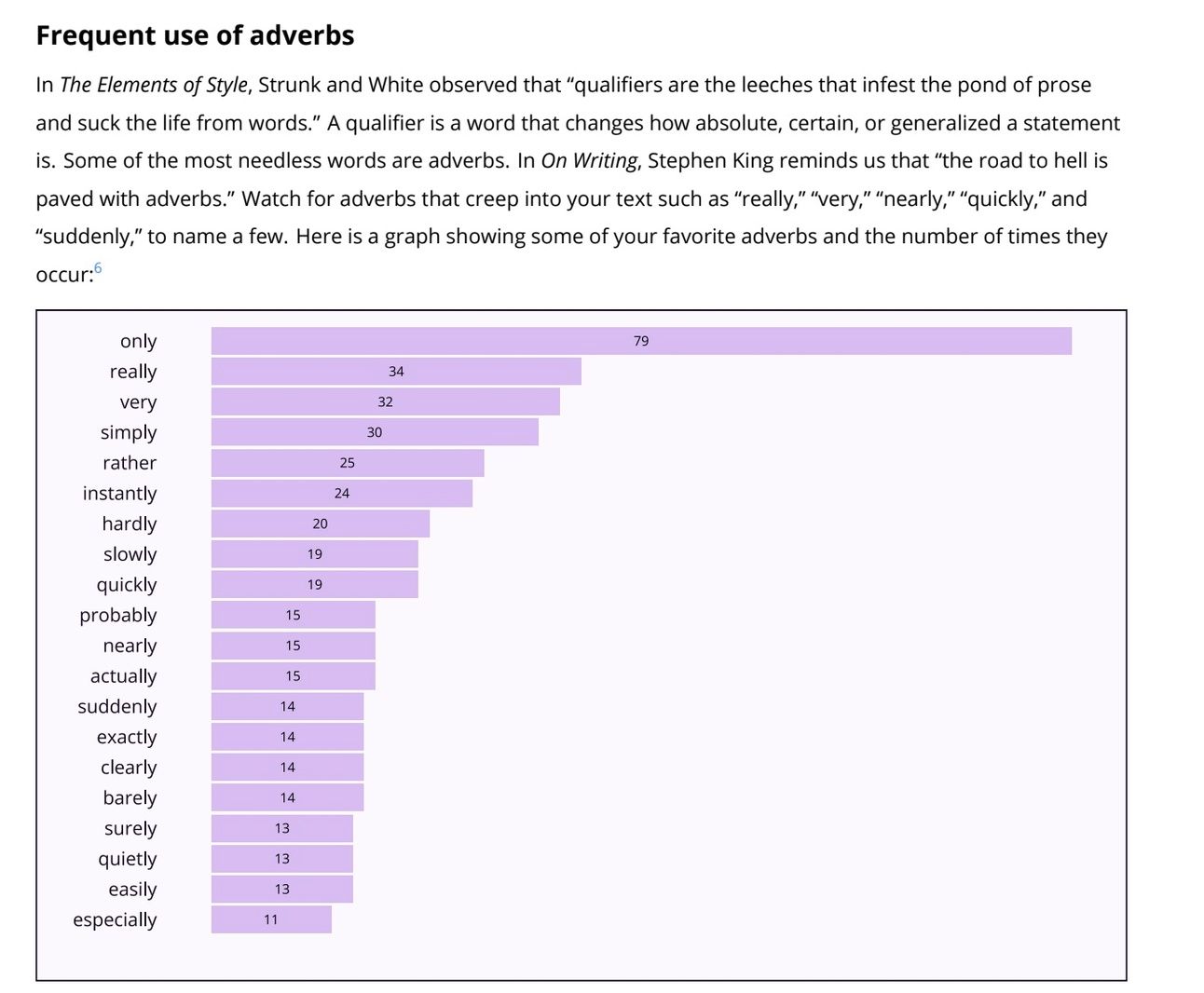
It’s pretty easy to command + F your way through your novel, deleting “slowly”s and “quickly”s. Your manuscript will instantly tighten!
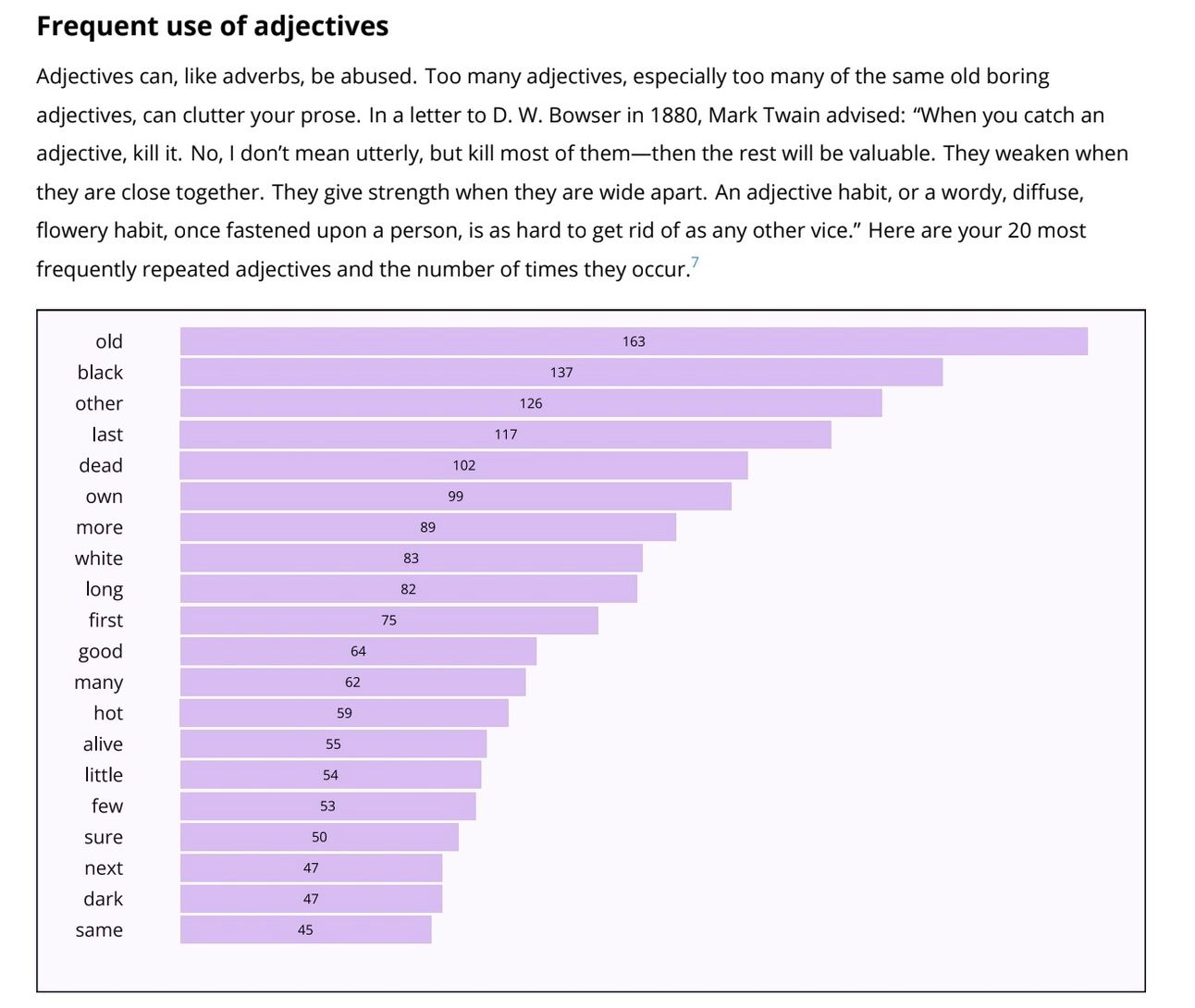
Most writers know adverbs are deadly, but adjectives can smother the action just as bad. I did a find/search on these adjectives (it took several hours) and usually deleted them.
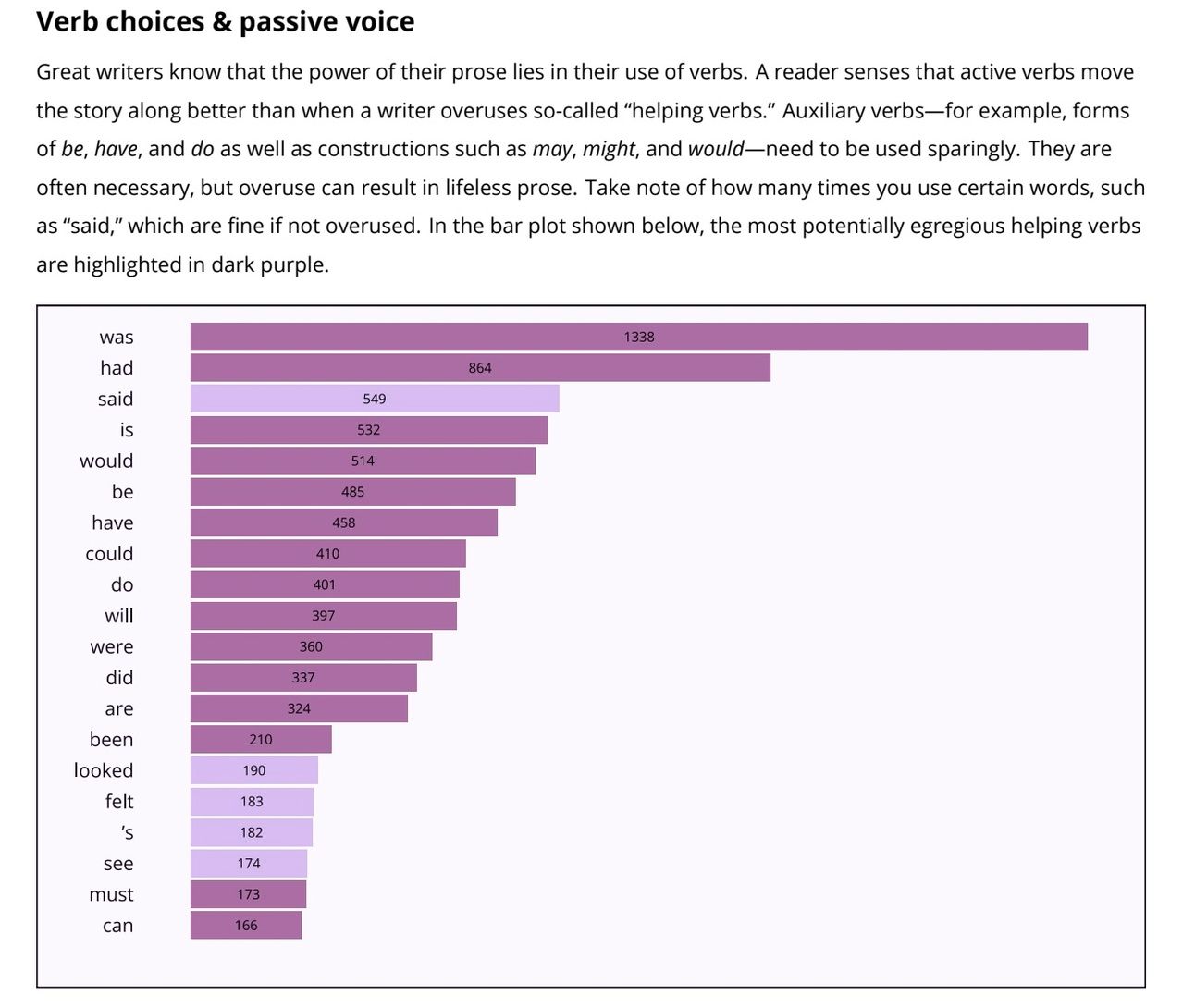
Being verbs are death! Am, is, are, was, were, be, being, been. Kill on sight. Resurrect if worthy.
I highly recommend using Authors AI to tighten your writing. If you use the code below (shared with me from another writer), you’ll get this $45 report for free. It’s ready in 10 minutes!
Second, I gave my manuscript a hefty injection of masculinity. I was pretty confident my hero functioned as a boy in general, but since I’m a woman, I knew my writing would inevitably drift to the feminine. My hero probably felt his way through too many scenes. He probably focused on his feelings more than I meant him to. I probably used verbs (gasped, dashed, cried out) that are a bit grand or girly.
With my novel still raw in my brain, I had no chance at gaining quick objectivity. I needed outside analysis. I needed it now. And THAT is something AI can be quite good at.
I fed my book to Chat GPT o3, one chapter at a time, using this prompt:
Please analyst the following chunk of narrative and flag the problem areas, suggesting alternatives. 1) Metaphors: are they masculine, or at least world-appropriate? (This is a duo of Elizabethan sea-faring culture + Hawaiian jungle island culture.) 2) Does my hero ever feel his way through a scene? 3) Do we spend too much time in his head? Hear too many of his thoughts? 4) Are his verbs a little girly OR too fantasy-ish? (Eg., "gasped," "started," "trembled," etc.) These words are fine in Tolkien because Tolkien is old, grand, and British, but I want my hero to sound like a visceral 13-year-old boy.
Chat GPT was cutthroat. It listed metaphors, descriptions, actions, and scenes where my hero was too soft, or too Tolkien/British. (I didn’t want my hero to tremble, ever. Shake? Jitter? Vibrate? Yes. But not tremble.)
AI gave me this invaluable piece of advice: If you want your character to sound masculine, use verbs to show competence. Prioritize verbs that show agency and resilience, even when your hero’s weak.
AI will never replace a real human editor, but it can certainly lighten the load. Whatever my editors think of Draft 2, they at least won’t have to slog through MANY scenes where my hero just wasn’t behaving or interacting with the world like a boy.
Did my AI makeover work? My (male) editors will let me know!
What I’m Reading + Book Tips
Besides reading my toddler Hello Ninja and Little Blue Truck on repeat, I’m reading All Things for Good by Thomas Watson, and I just finished revisiting My Life for Yours—perfect for a new mama establishing the flavor of her home.
I’m also re-devouring the phenomenal Ashtown Burials series by ND Wilson. I’m enjoying them even more the second time around—probably because I’ve grown both as a writer and as a reader over the past decade. I have now published a MG novel of my own, so I know how hard it is. I’ve also read a lot more MG fiction, so I know how meh it can be. If you haven’t read Ashtown yet, put it at the top of your summer list!
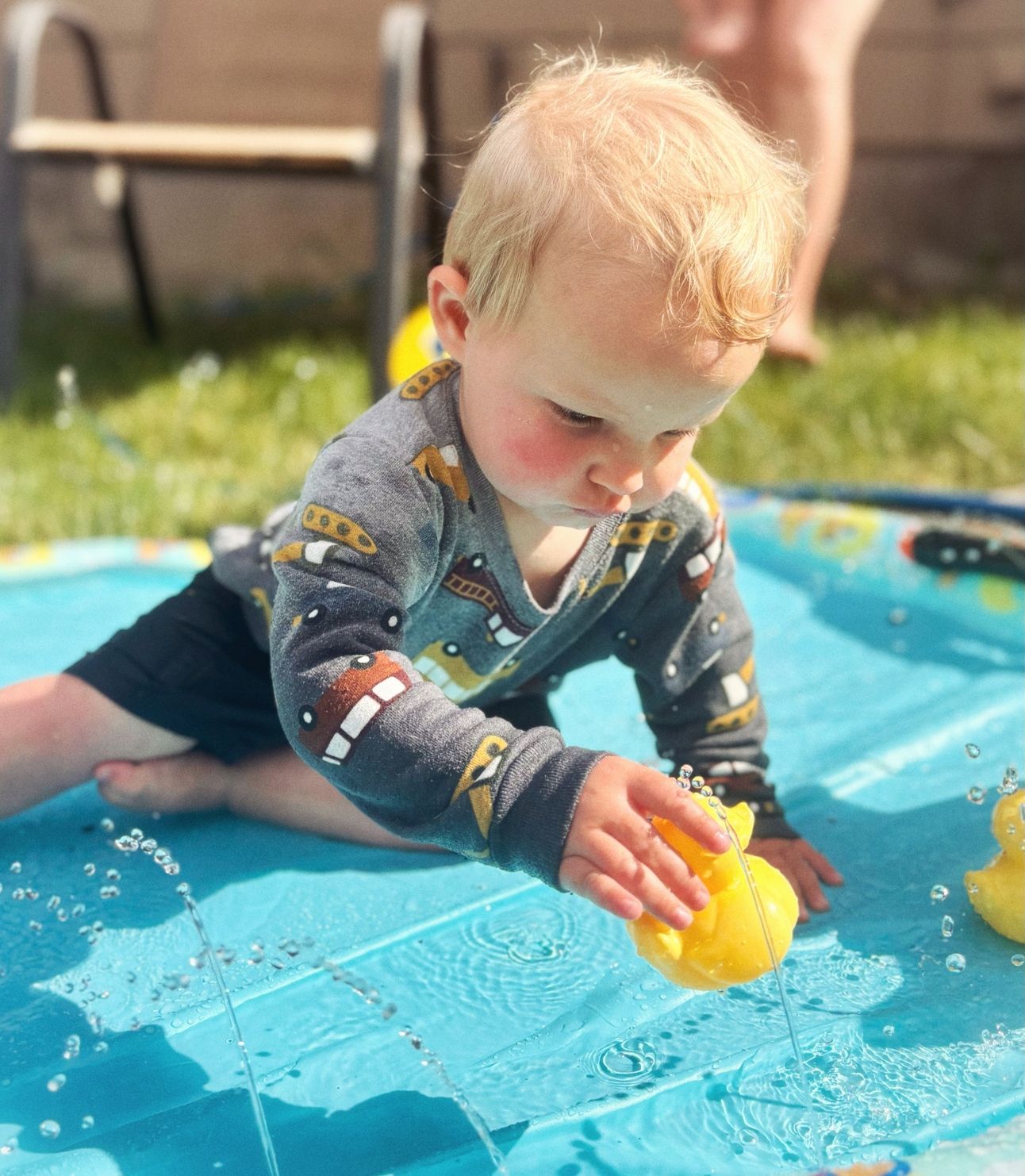
Cedar might not remember this as the summer of chlorinated water, but I plan to.
Now for book recommendations! Tolkien once said that the seeds of stories often spring from “the leaf mold of the mind”—the accumulation of stories, myths, languages, and life experiences you’ve absorbed. Some leaf mold happens organically. But you can (and should) also feed it deliberately.
Here are some of my top recommendations for creating leaf mold of the mind:
Bible - steep thyself
Myths & Ancient History
The Iliad
The Odyssey
Herodotus
Thucydides
Edith Hamilton’s Mythology
Norse myths
The Enchanted Land: Myths & Legends of Britain’s Landscape
Classics
Shakespeare (Henry IV & V, Much Ado About Nothing, Hamlet)
Swiss Family Robinson
King Solomon’s Mines
Treasure Island
Sherlock Holmes
Pride & Prejudice
Emma
Sense & Sensibility
Not rubbish like Little Women
Good books in YOUR genre: middle grade, young adult, fantasy, mystery, etc.
Good books NOT in your genre. Cross train!
Authors that excel in voice/characters/world-building:
Tom Wolfe (Man in Full, Bonfire of the Vanities)
Raymond Chandler (all the Philip Marlowe detective novels)
Terry Pratchett
Leif Enger (Peace Like a River)
ND Wilson
PG Wodehouse
Lauren Wolk (Wolf Hollow)
CS Lewis, of course
Tolkien, obviously
Read nonfiction books that shape you in real life so you know how to craft compelling stories—and how to live a good story yourself when things get tough.
CS Lewis books & essays
Dutch and French WWII resistance stories
The Hiding Place
God’s Smuggler
Unbroken
The Persecutor (inspired my debut novel, Forbidden Child)
The Fourth Turning
Quote of the Month
“I decided that I would continue to write as long as I lived, even if I never sold one thing, because that was what I wanted out of my life.” - George Bernau, quoted in The Art of War for Writers
Movie Recommendations
Since I shared a list of foundational books, here’s a (wildly incomplete) list of foundational movies—movies that shaped me and that will hopefully also shape my son:
The Lion King (original and remake)
How to Train Your Dragon
The Sea Hawk (Errol Flynn)
Robin Hood (Errol Flynn)
The Sound of Music
The Swiss Family Robinson
Star Wars (original trilogy)
Indiana Jones (original trilogy)
The Last of the Mohicans
Jurassic Park
The Patriot
Gladiator
Sherlock (Benedict Cumberbatch)
Slumdog Millionaire
I Am Legend
The Shawshank Redemption
Die Hard
13 Hours
Band of Brothers
Cinderella (Kenneth Branagh’s version - I might not make Cedar watch this, but daughters? Yes!)
Warrior
Cinderella Man
Valkyrie
The Secret Life of Walter Mitty
The Magnificent Seven (remake)
Top Gun: Maverick
Parting Shots
Do you use AI in your writing, planning, or research process? Do you think using AI would make you a dumb, lazy cheat? Reply to this email and let me know! How has it helped you? Where do you draw the line? If you avoid it, why?
Go write win!
Cheers,
Gwen
